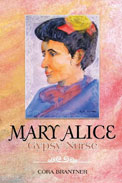
 |
Mary Alice: Gypsy Nurse
by Cora Brantner
PageTurner Press and Media
In Brantner’s narrative, a chance encounter between a nomadic Gypsy community and an injured man, Ernest Beebe, sets the tone for the theme of boundless compassion and empathy that is prevalent throughout the novel. Though many see the gypsies as primitive, they ensure that Ernest honors his commitments when he impregnates Ercyline. While he himself is morally corrupt in nearly every way, the one good thing he does is give birth to Mary Alice, whose journey throughout life becomes a testament to living a life of faith and resilience.
Though Mary Alice’s story commences in the turbulent times of the Civil War, where the Gypsies do everything in their power to evade the chaos, her unique nature and ability to quickly learn is apparent early on with her mastery of plantation and farming protocols, as well as her ability to mimic bird noises at a mere seven months. Positivity, as they say, is contagious, and being around the spirited Annabelle does wonders for Mary Alice. Moments like hide-and-seek and telling her mother that her younger brother Carsie and she were simply following the line of ants to the cherries capture the many whimsical moments that will come in the protagonist’s life.
When Mary Alice marries Frank Walden, her persona channels an air of dignity that fits nicely into her role as a nurse and midwife, one that will put her at the front lines of traumatic experiences like the train wreck and, in other cases, leave her to unravel and heal a community after a great loss. Through it all, what makes Mary Alice’s character so endearing is the resounding faith she demonstrates through hymns for the Lord, knowing that he will help her and those around her emerge from any darkness that comes her way.